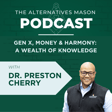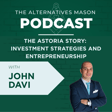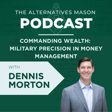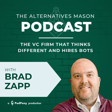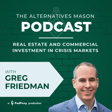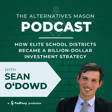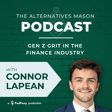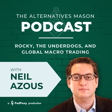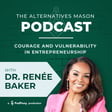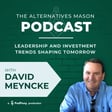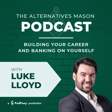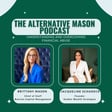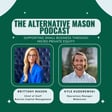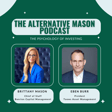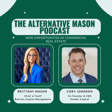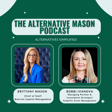
The Alternatives Mason: Building Alts Knowledge Brick by Brick | Episode 10 | The Behavioral Investor Featuring Dr. Daniel Crosby
Welcome to The Alternatives Mason: Building Alts Knowledge Brick by Brick. Banrion Capital Management uses technology to help independent advisors scale and educate themselves on alternative investments. Since education is such a big piece of the Banrion mission and business, we are excited to kick off this series to dive into the nits and grits of the alternatives space. Episode 10 "The Behavioral Investor" Features Dr. Daniel Crosby, best selling author and Chief Behavioral Officer at Orion Advisor Solutions.
In his role at Orion, Dr. Crosby develops behavioral tools, training, and technology for financial advisors to allow for the practical application of behavioral science.
Educated at Brigham Young and Emory Universities, Dr. Daniel Crosby is a psychologist and behavioral finance expert who helps organizations understand the intersection of mind and markets.
Dr. Crosby's first book, Personal Benchmark: Integrating Behavioral Finance and Investment Management, was a New York Times bestseller. His second book, The Laws of Wealth, was named the best investment book of 2017 by the Axiom Business Book Awards and has been translated into Japanese, Chinese, Vietnamese and German. His latest work, The Behavioral Investor, is an in-depth look at how sociology, psychology and neurology all impact investment decision-making.
Daniel was named one of the “12 Thinkers to Watch” by Monster.com, a “Financial Blogger You Should Be Reading” by AARP and a member of InvestmentNews prestigious "40 Under 40". When he is not consulting around market psychology, Daniel enjoys independent films, fanatically following St. Louis Cardinals baseball, and spending time with his wife and three children. He is also the host of the hit podcast, "Standard Deviations".
Connect With Dr. Daniel Crosby- Standard Deviations Podcast
- Dr. Daniel Crosby on LinkedIn
- Dr. Daniel Crosby on 𝕏
- Dr. Daniel Crosby on Instagram
- Dr. Daniel Crosby on YouTube
Learn More About Banrion: Banrion Capital Management
Follow Brittany on 𝕏: @Brittany_Mason
Follow Banrion on 𝕏: @Banrion_Capital
Subscribe to our YouTube Channel: @BanrionCapital
Important Disclosures:
The opinions expressed on the “The Alternative Mason Podcast” are for general informational purposes only and are not intended to provide specific advice or recommendations for any individual or on any specific security.
It is only intended to provide education about the financial industry. To determine which investments may be appropriate for you, consult your financial advisor prior to investing. Any past performance discussed during this program is no guarantee of future results.
The guests featured on this program may be participants on Banrion Capital Management’s platform. As such Banrion may receive payment for their participation as a platform partner.
Any indices referenced for comparison are unmanaged and cannot be invested into directly. As always please remember investing involves ris
